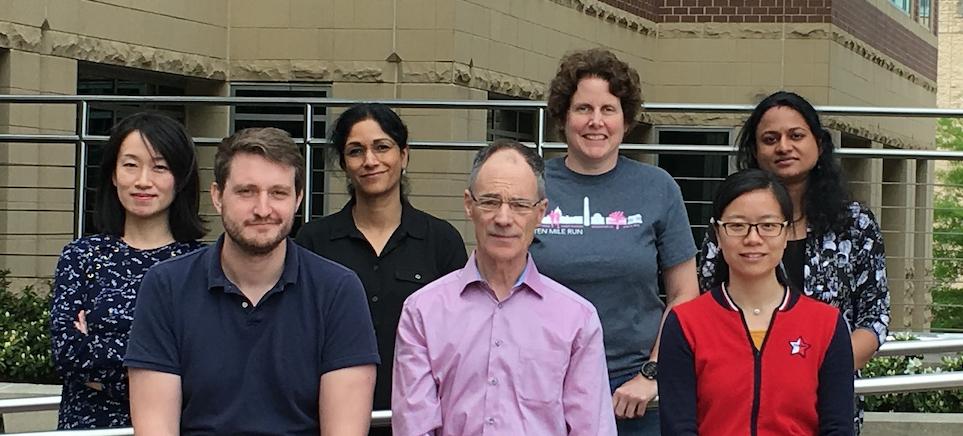Molecular and Cellular Immunology Section
Established in 1988
Eric Long, Ph.D.
Chief, Molecular and Cellular Immunology Section

Major Areas of Research
- Innate lymphocyte function in malaria
- Fighting cancer with natural killer cells (NK): how to break tumor cell resistance
- Regulation of NK cells by activating and inhibitory receptors
Program Description
The main interest of our lab has been the molecular basis of the regulation of human natural killer (NK) cell function in the context of different stimuli and the contribution of activating and inhibitory receptors to intracellular signals that dictate NK cell reactivity. NK cells are lymphocytes with important functions that include defense against viral and parasitic infections, elimination of tumor cells, regulation of adaptive immunity through cytotoxicity and cytokine secretion, and stimulation of vascular remodeling in early pregnancy. Fundamental knowledge on the regulation of natural killer cells can be applied to study their function in diseases such as cancer and malaria.
Severe malaria caused by Plasmodium falciparum parasite infection kills approximately 280,000 young children every year. Resistance to malaria is dependent on antibodies that are acquired after years of exposure. We have shown that NK cells destroy P. falciparum-infected red blood cells in the presence of antibodies from adults that have acquired clinical immunity to malaria. The antibody-dependent cellular cytotoxicity (ADCC) response of NK cells that we measured in peripheral blood samples obtained from people living in a region of high malaria transmission was associated with greater resistance to disease. A more detailed examination of the composition and function of NK cells in people exposed to intense malaria transmission is needed. See more about the NIAID Malaria Research Program and the MRP Collaborative Research Fellowship Award.
There has been remarkable progress in the application of basic discoveries in immunology to clinical care of cancer patients. Immunotherapy has successfully eliminated otherwise incurable cancers. Cytotoxic T cells and NK cells have been engineered to express chimeric antigen receptors (CAR) that selectively target tumor cells for elimination. However, the limited information currently available on signal transduction by CARs is a concern. Furthermore, a limitation of NK cells for CAR expression is their control by dominant inhibitory receptors for HLA class I. We are engineering NK-tailored CARs that can overcome this inhibition. A significant advantage of our approach is that CAR-NK cells would remain under physiological regulation by inhibitory receptors until they encounter a tumor cell.
Biography
Education
Ph.D., University of Geneva, Switzerland
Dr. Long has a biochemistry degree from the ETH Zürich, and a Ph.D. in molecular biology from the University of Geneva, Switzerland. After postdoctoral research at the Carnegie Institution for Science and the National Cancer Institute, NIH, he returned to Geneva as a faculty member in the Department of Microbiology. There, he applied molecular approaches to isolate the first cDNA clones for MHC class II molecules. In 1983, he joined the Laboratory of Immunogenetics at the National Institute of Allergy and Infectious Diseases, NIH. While studying antigen presentation to CD4 T cells, he discovered new pathways for processing and MHC-II-restricted presentation of antigens from different cellular compartments. He became Senior Investigator and Head of the Molecular and Cellular Immunology Section in 1988.
In the mid-90’s, his main interest turned to the regulation of NK cell function, after his team identified molecular clones for a family of NK cell inhibitory receptors called KIR that engage MHC class I molecules on healthy cells to prevent killing by NK cells. The discovery of the signaling basis for inhibition by these receptors was selected as a "Pillar of Immunology" by the Journal of Immunology. His laboratory has uncovered fundamental properties of NK cell activation for cytotoxicity, which requires engagement of synergistic pairs of coactivation receptors, and how they could be exploited to design chimeric antigen receptors (CAR) tailored for NK-dependent lysis of tumor cells. As part of the Malaria Research Program at NIAID, his group showed that NK cells lyse red blood cells infected by Plasmodium falciparum in the presence of antibodies isolated from plasma of individuals that live in an area of high malaria transmission. Among such individuals, those with a higher abundance of specialized NK cells with stronger responsiveness to an antibody-binding Fc receptor had better odds of becoming resistant to malaria. His lab is interested in NK cell functionality in people chronically infected by Plasmodium falciparum and how NK cells protect them against malaria.
Selected Publications
Sim MJW, Stotz Z, Lu J, Brennan P, Long EO, Sun PD. T cells discriminate between groups C1 and C2 HLA-C. Elife. 2022 May 19;11:e75670.
Anton OM, Peterson ME, Hollander MJ, Dorward DW, Arora G, Traba J, Rajagopalan S, Snapp EL, Garcia KC, Waldmann TA, Long EO. Trans-endocytosis of intact IL-15Ralpha–IL-15 complex from presenting cells into NK cells favors signaling for proliferation. Proc Natl Acad Sci. 2020 Jan 7; 117(1):522-531
Zhuang X, Long EO (2019) Inhibition-resistant CARs for NK cell cancer immunotherapy. Trends Immunol. 2019 Dec;40(12):1078-1081.
Sim MJW, Rajagopalan S, Altmann DM, Boyton RJ, Sun PD, Long EO. Human NK cell receptor KIR2DS4 detects a conserved bacterial epitope presented by HLA-C. Proc Natl Acad Sci. 2019 Jun 25;116(26):12964-12973.
Hart GT, Tran TM, Theorell J, Schlums H, Arora G, Rajagopalan S, Sangala ADJ, Welsh KJ, Traore B, Pierce SK, Crompton PD, Bryceson YT, Long EO. Adaptive NK cells in people exposed to Plasmodium falciparum correlate with protection from malaria. J Exp Med. 2019 Jun 3;216(6):1280-1290.
Zhuang X, Long EO CD28 homolog is a strong activator of natural killer cells for lysis of B7H7-positive tumor cells. Cancer Immunol Res. 2019 Jun;7(6):939-951.
Research Group

Back row (L-R): Xiaoxuan Zhuang, Sumi Rajagopalan, Mary Peterson, Padmapriya Sekar. Front row (L-R): Malcolm Sim, Eric Long, Jingwen Jiang
- Sumati Rajagopalan, Ph.D., Staff Scientist
- Kaveh Abdi, Biologist
- Malcolm Sim, Postdoctoral Fellow
- Xiaoxuan Zhuang, Postdoctoral Fellow
- Padmapriya Sekar, Postdoctoral Fellow
- James Woods, Post-baccalaureate Fellow
- Paul Brennan, Post-baccalaureate Fellow
News
Eric Long is the new Director of the Malaria Research Program, Division of Intramural Research, NIAID - April 2022
Geoff Hart’s paper in J Exp Med was one among ten chosen to be highlighted in the JEM Immunology Collection 2020—May 2020
The lab was ranked in the top 0.25% in immunology according to a standardized citation metrics database–August 2019
Xiaoxuan Zhuang has received an NIH Fellows Award for Research Excellence—2019
Geoff Hart’s paper in J Exp Med was one among ten chosen to be highlighted in the JEM Clinical Collection 2019—Summer 2019
Malcolm Sim’s paper in PNAS was accompanied by a Commentary article entitled “A natural killer cell receptor takes sharp aim at the world of bacteria.” —June 2019
Sumi Rajagopalan delivered the Keynote Address at the opening of the Annual Meeting of the American Society of Reproductive Immunology—June 2018
Press release:
Killer immune cells that halt malaria could hold key to new vaccines—June 2018
How to Apply
We are always interested in recruiting bright and motivated young scientists. If you think you fit the description, send us an application. Experience in imaging, cell biology, proteomics, and bioinformatics would be a plus.
Postdoctoral fellow
Submit in PDF format
- Statement of interest (why you would like to work here)
- Curriculum vitae and bibliography
- Name and contact of three references
Note: Do not attach letters of recommendation to your application.
Malaria Research Program Collaborative Research Fellowship
Fellowships will be awarded annually to a limited number of top applicants who aspire to improve our understanding of the biology, host-pathogen interactions, and transmission of malaria parasites.
Research Networks
Malaria Research Program
Training Programs
NIH Postdoctoral Malaria Research Program Collaborative Fellowship

